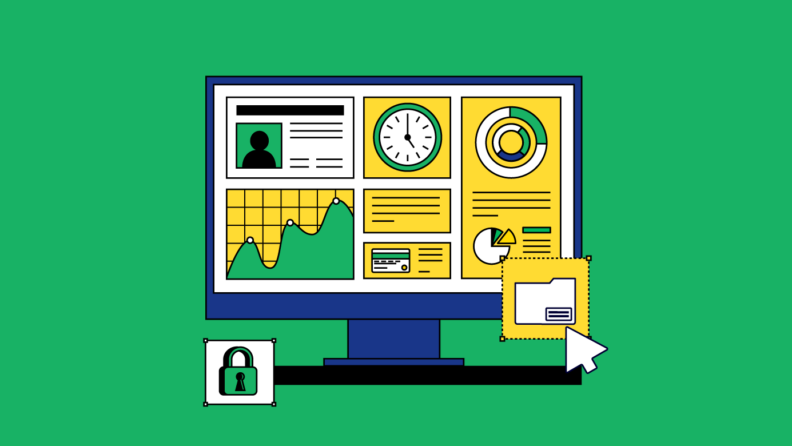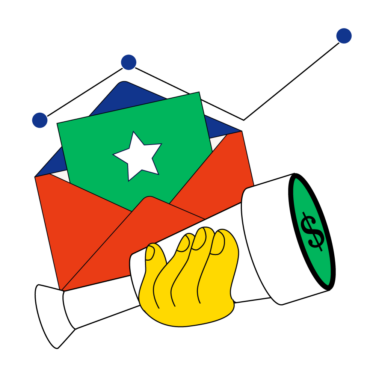Customer relationship management (CRM) software is often among the most valued technology for revenue-generating teams. Your CRM is where you store your customer data, track leads through your sales pipeline, automate your marketing communications, and so much more.
There are a ton of great CRM software options out there—you’ve probably heard of the many companies that use Salesforce, Hubspot, Zoho CRM, or Pipedrive—and you may have even taken these for a test drive.
But every business is unique, and sometimes an out of the box solution just doesn’t deliver all the features and functionalities you’re looking for. So you might be facing a dilemma…
To buy, or to build?
What Is Custom CRM Software?
Custom CRM software is a digital platform built from scratch, designed to suit your company's specific business processes and needs.
You can build software with common CRM features like contact management, marketing automation, and sales process management tools. But you can also set up custom fields, specialized dashboards, custom reports, and other unique analytics capabilities.
Can You Build Your Own CRM Software?
You can absolutely pursue custom CRM development at your organization. But you’ll want to consider whether this is the best approach to meet your business needs, and whether the benefits will outweigh the costs. Sure, you can build your own CRM…but should you?
Should you build a custom CRM software?
CRM software development can be complex, time-consuming, and expensive. Here are a few factors to consider before launching into this type of project:
- Have you done extensive research into the CRM software solutions available?
- Do you have a unique business model, sales process, or customer support needs?
- Do you have an in-house development team, or would you need to outsource the work?
- Would it be a collaborative project between developers, sales reps, marketers, and your customer experience team?
- Is building a software platform the best use of your team members’ time?
- Is your team capable of making a CRM solution that’s scalable to your business growth?
- Could you find a low-code builder to support the project, rather than starting from scratch?
- Do you have an interim solution in place to support your teams during the custom CRM development?
Do your due diligence and give it some real thought. You might also pose some of these questions to your team, and get their input on the matter.
At the end of the day, you want a tool that will streamline your processes and facilitate customer relationship management efforts. If building your own CRM has the potential to greatly improve your customer satisfaction and retention rates, then it might be the right choice for you!
What Are The Benefits Of A Custom CRM System?
There are tons of benefits of CRM software, but the main benefit of building a custom CRM solution is that you get to decide exactly how it works and what features it includes. It’s a bespoke solution tailored specifically to the needs of your teams, and you can set it up to integrate with your existing tech stack.
These are two important things to consider, because a 2022 study from Gartner found that a lack of integrations and failing to provide the advertised benefits were among the top reasons people chose to shop around for another CRM platform.
Beyond these key factors, here are some other benefits of a custom solution:
- Having complete control over the security of your customer information.
- Storing your data on-premise or in an owned cloud-based storage solution.
- Avoiding complex pricing structures and additional costs for add-on modules, etc.
- Connecting your CRM with your other apps and tools directly via APIs.
- Implementing custom operational CRM tools, like workflow templates and task automation.
- Setting up accurate, real-time reporting dashboards to track and forecast key metrics.
These are just a few potential benefits of a custom solution. It’s possible that there are also benefits unique to your business context. Just be sure you’re weighing the potential risks and costs into your decision, too.
How Much Does A Custom CRM Cost?
The cost of custom CRM development depends on a number of factors, some of which we already touched on. But for clarity, here are a few costs that will influence your project’s budget:
- Whether you opt for an in-house or external software development team.
- The scope and complexity of the project, and your project management approach.
- The type of CRM software you choose to build, and the features you want to include—will it cover lead management, sales automation, a help desk, email marketing tools, or all of the above?
- Any added administrative work that comes with managing a software development project. This could include billing and invoicing, project management, documentation, managing tools, etc.
- Whether the platform will require ongoing maintenance from your software development team.
- Whether managing the platform will require additional time and effort from your development, marketing, customer support, or sales teams.
Keep in mind that there’s more to the picture than the upfront cost of building the CRM software. Software products require ongoing maintenance and updates. Over time, a homemade tool can become cumbersome and costly—and take your team away from other work that might be more impactful.
What Are You Looking For In A CRM?
We’ll match you with an advisor who can help you find the right CRM for you—whether it’s custom or pre-built.
How Much Does A Pre-Built CRM Software Cost?
If you decide to purchase a pre-built software, the cost of a CRM solution can vary. Most providers offer multiple pricing tiers, which generally start from anywhere between $10-$30 per user, per month. And some highly customizable CRM platforms have custom pricing, particularly when you’re looking at enterprise-level CRM tools.
| Tools | Price | |
|---|---|---|
| Thryv | From $15/user/month | Website |
| CRM Creatio | From $25/user/month | Website |
| Capsule | From $18/user/month (billed annually) | Website |
| monday CRM | From $8/user/month (billed annually) | Website |
| HubSpot CRM | From $20/month | Website |
| Pipedrive CRM | From $21.90/user/month | Website |
| Keap | From $249/month (billed annually) | Website |
| MRPeasy | From $49/user/month | Website |
| Streak | From $49/user/month (billed annually) | Website |
| Zendesk Sell | From $19/user/month | Website |

Compare Software Specs Side by Side
Use our comparison chart to review and evaluate software specs side-by-side.
Compare SoftwareThat said, there are also several options of free CRM software that can be a totally functional option for small businesses and startups. Many software solutions also offer free trials, so you can try them out before giving your credit card info.
How Do You Build Custom CRM Software?
Alright, so you’ve made the decision to build a CRM for your business. Where to begin? Here are a few steps to follow to ensure smoother project management and a high-quality output:
1. Survey your users
Start by going to your end users. Depending on your business model and company structure, this might be your sales team, your marketing team, your customer success team, or a combination. Find out what their needs are, and in what order. Consider what tools and features will have the biggest impact on their day to day. Remember, you want to build a platform that will alleviate their workload—not add to it.
2. Scope your project
With intel from your user base, it’s time for project planning! Map out what success looks like and the objectives and key results of your initiative. It’s very important to align your software development team at this point, and inform your end user teams about the scope of the project, too. With your project plan in place, you can break it down into smaller tasks, timelines, and milestones.
3. Start with an MVP, then iterate
It’s better to start with something small and then build on it, rather than trying to get every bell and whistle into your V1. Don’t overdo it—get the core functionality working smoothly and effectively before you start to add on additional features. User testing is also essential to creating a beloved, valuable product. So be sure to follow up with your team members regularly, and have them give feedback on the platform so you can iterate and improve as needed.
More Articles
4. Be proactive with maintenance
Remember, one of the greatest hidden costs of a custom solution is maintaining it. If you opt for a personalized CRM software, make sure your team is ready and able to get ahead of tech debt before it piles up. You might even plan regular audits where you gather user feedback and prioritize what you’ll tackle next from there.
DIY Diehards, Go Forth Building Your Custom CRM Software
CRMs, like home storage solutions, are personal. Sometimes the boxed furniture option just won’t cut it! But it’s important to take your measurements and source your materials before you start hammering away.
With any luck, this article has illuminated some potential risks, rewards, or considerations you may not have thought of when it comes to building a custom CRM. Hopefully, it’s made your choice of how to move forward a little bit clearer. Whatever you choose, keep your team members in mind. Ultimately, they’ll be the ones using the system, so you want it to support their needs.
Looking for more RevOps content? Subscribe to The RevOps Team newsletter for expert advice, software reviews, and other resources to help you deliver predictable growth at scale.


